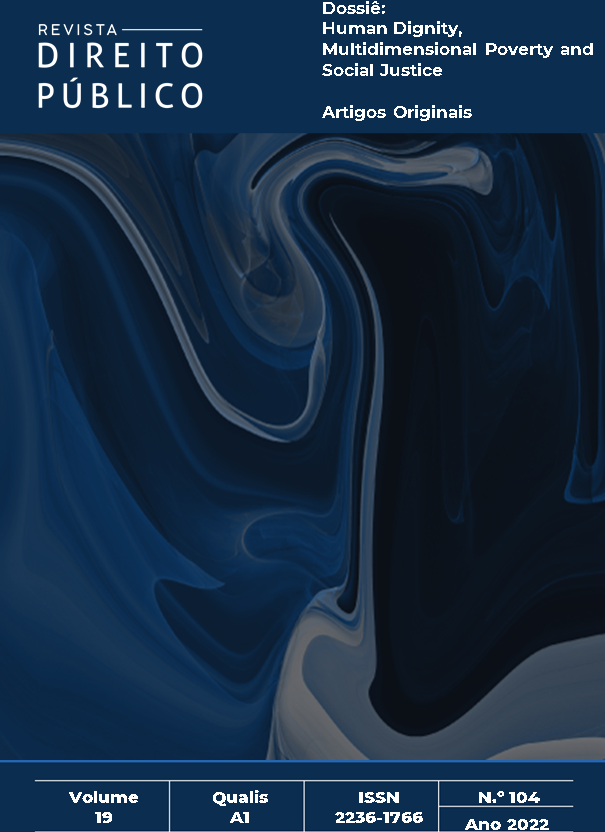Pobreza e o Exercício da Maternidade:
Notas Sobre a Abordagem Consensual e a Abordagem “Processual” em Processos de Destituição do Poder Familiar.
DOI:
https://doi.org/10.11117/rdp.v19i104.6782Abstract
This article is the result of my participation as a researcher in an initiative of Cardiff University and the State University of Campinas (UNICAMP) for the study of poverty in the Brazilian context, having as a pilot initiative, the application of focus groups in the city of Campinas (SP) and my experience as a researcher of termination of parental rights (DPF) actions in the state of São Paulo. In the context of the pilot research carried out, a focus group (FG) was conducted with women in situations of severe vulnerability, then hosted in the same service, aimed at pregnant women, women who had recently given birth or with their young children. One of the results of this FG showed that there is a constant contestation, on the part of the public power, of the capacity to exercise custody and parental power in relation to their children, which is considered, by them, as one of the risks experienced by poor children, that of growing up without their families of origin. Together with this material, I present one of the cases analyzed in the context of my doctorate in Human Rights in which the magistrate decides for the DPF of a 17-year-old girl and in a case in which he uses the description of the lack of utensils to receive the child as one of the reasons for the DPF. Through these cases, I reflect, based on the theoretical and methodological framework of the consensus approach to poverty, on how the elements that define "poverty", in different contexts, can lead to complex and irrevocable decisions, such as the definitive separation between mothers and children. This article is based on empirical material obtained in the context of the study of poverty in the Brazilian context with the application of focus groups in the city of Campinas (SP) and my experience as a researcher of Termination of parental rights (DPF) actions in the state of São Paulo. In the context of the pilot research carried out, a focus group (FG) was conducted with women in situations of severe vulnerability, then hosted in the same service, aimed at pregnant women, women who had recently given birth or with their young children. One of the results of this FG showed that there is a constant contestation, on the part of the public power, of the capacity to exercise custody and parental power in relation to their children, which is considered, by them, as one of the risks experienced by poor children, that of growing up without their families of origin. Together with this material, I present one of the cases analyzed in the context of my doctorate in Human Rights in which the magistrate decides for the DPF of a 17 year old girl and in a case in which he uses the description of the lack of utensils to receive the child as one of the reasons for the DPF. Through these cases, I reflect on the basis of the theoretical and methodological framework of the consensus approach to poverty, on how the elements that define "poverty" in different contexts can lead to complex and irrevocable decisions, such as the definitive separation of mothers and children.
Downloads
Published
How to Cite
Issue
Section
License
Copyright (c) 2023 Direito Público

This work is licensed under a Creative Commons Attribution-NonCommercial 4.0 International License.
O(s)/A(s) autores(as) dos manuscritos submetidos concorda(m) com as regras a seguir:
1) Todos os autores e autoras participaram do trabalho, são responsáveis pelas ideias e conceitos nele emitidos e atestam sua conformidade com os princípios éticos exigidos.
2) Todos os autores e autoras concordam com a forma final do trabalho e em ceder os direitos para publicação nos canais de publicação da Escola de Direito do IDP.
3) Todos os autores e autoras informam que o manuscrito é de sua autoria e assumem a responsabilidade pelo trabalho, declarando que a obra a ser publicada não infringe quaisquer direitos de propriedade intelectual de terceiros.
3.1) Em caso de submissão simultânea, além da reprovação imediata do artigo e comunicação ao(s) respectivo(s) periódico(s), a Revista Direito Público se reserva o direito de não receber novas submissões de todos os autores implicados pelo prazo de 2 (dois) anos, contado a partir da data de ciência do fato.
4) Todos os autores e autoras autoriza(m) a edição de seu trabalho e cede(m) à Escola de Direito do IDP os direitos de autor para reproduzir, editar e publicar ou veicular o citado trabalho em qualquer forma midiática, resguardada a autoria, em particular sob forma digital, em arquivo eletrônico online na Internet, bem como armazená-los em seu repositório de acordo com o desenvolvimento do processo editorial. Esta concessão não terá caráter oneroso para a Escola de Direito do IDP, não havendo remuneração sob qualquer modalidade pela utilização do referido material, tendo este o caráter de colaboração científica.












